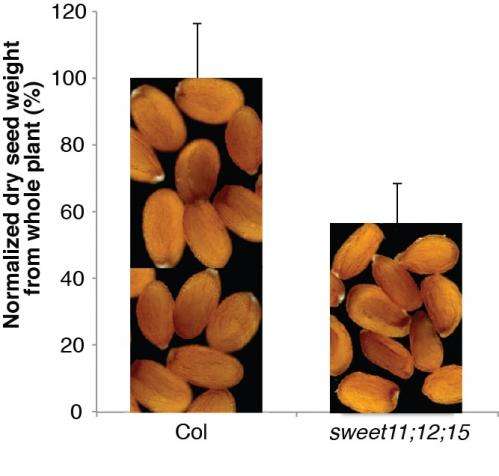Food-delivery process inside seeds revealed

Inside every seed is the embryo of a plant, and in most cases also a storage of food needed to power initial growth of the young seedling. A seed consists mainly of carbohydrates and these have to be is transported from the leaf where they are assimilated into the seed's outer coat from the parent plant and then accessed by the embryo. If not enough food is delivered, the seeds won't have the energy to grow when it's time to germinate. But very little is understood about this delivery process.
New work from a team led by Carnegie's Wolf Frommer identifies biochemical pathways necessary for stocking the seed's food supplies. These findings could be targeted when engineering crops for higher yields.
Published in The Plant Cell, the research identifies three members of the SWEET family of sugar-transport proteins that are used to deliver the sugars that are produced in the plant's leaves to the embryonic plant inside of a seed.
Frommer's lab has done extensive work on SWEET proteins, which have an array of functions in plants including nectar secretion. SWEET transporters are also vulnerable to takeover by pathogens, which thereby hijack the plant's food and energy supplies.
The research team—Carnegie's Li-Quing Chen, I Winnie Lin, Xiao-Qing Qu, Davide Sosso, and Alejandra Loñdono, as well as Heather McFarlane and A. Lacey Samuels from the University of British Columbia—found that SWEETS 11, 12, and 15 funnel sucrose toward the developing plant embryos through multiple pathways.
Specially created mutants that eliminate these three SWEET transporters show wrinkled seeds similar to those Mendel used to track down the basic rules of genetics. Embryonic development is clearly retarded in these mutants because they are unable to move sugars from the seed's coat to the embryo inside.
"Our findings answer long-held questions about embryonic plant nutrition and have major potential importance for improving crop yields," Frommer said.
Journal information: Plant Cell
Provided by Carnegie Institution for Science



















